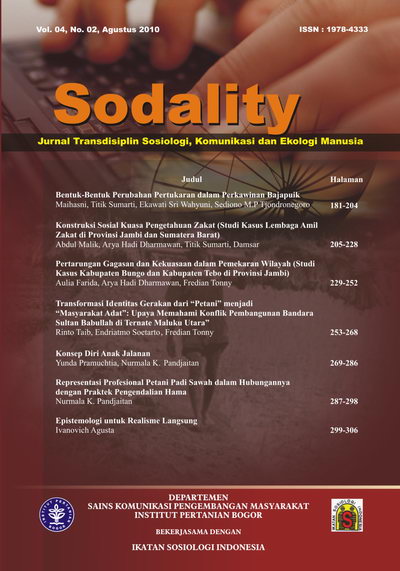Representasi Profesional Petani Padi-Sawah dalam Hubungannya dengan Praktek Pengendalian Hama
Abstract
The purpose of this research is to apprehend plant disease management practices from a psyhosocial viewpoint. Is there any relationship between plant disease management practices and the professional representations of the farmers? What influence does professional context have in this relationship? How does participation in SLPHT, used to spread IPM Practices, influence rice farmers in plant disease management? The relationship between professional representations and pest management practices varies depending on the professional context. When institutional coercion is marked, it is the legal prescriptions which influence the relationship between professional representations and practices. Inversely, when institutional coercion is less marked, professional representations guides practices. Participation in SLPHT is unrelated to plant disease management by the rice farmers. This research aims to contribute to the study of adult training by showing how the professional context can influence the adoption of innovation.
Published
2010-05-04
How to Cite
Katrina PandjaitanN. (2010). Representasi Profesional Petani Padi-Sawah dalam Hubungannya dengan Praktek Pengendalian Hama. Sodality: Jurnal Sosiologi Pedesaan, 4(2). https://doi.org/10.22500/sodality.v4i2.5843
Section
Articles
Authors who publish with this journal agree to the following terms:
- Authors retain copyright and grant the journal right of first publication with the work simultaneously licensed under a

This work is licensed under a Creative Commons Attribution 4.0 International License. that allows others to share the work with an acknowledgement of the work's authorship and initial publication in this journal. - Authors are able to enter into separate, additional contractual arrangements for the non-exclusive distribution of the journal's published version of the work (e.g., post it to an institutional repository or publish it in a book), with an acknowledgement of its initial publication in this journal.
- Authors are permitted and encouraged to post their work online (e.g., in institutional repositories or on their website) prior to and during the submission process, as it can lead to productive exchanges, as well as earlier and greater citation of published work (See The Effect of Open Access).





.png)









